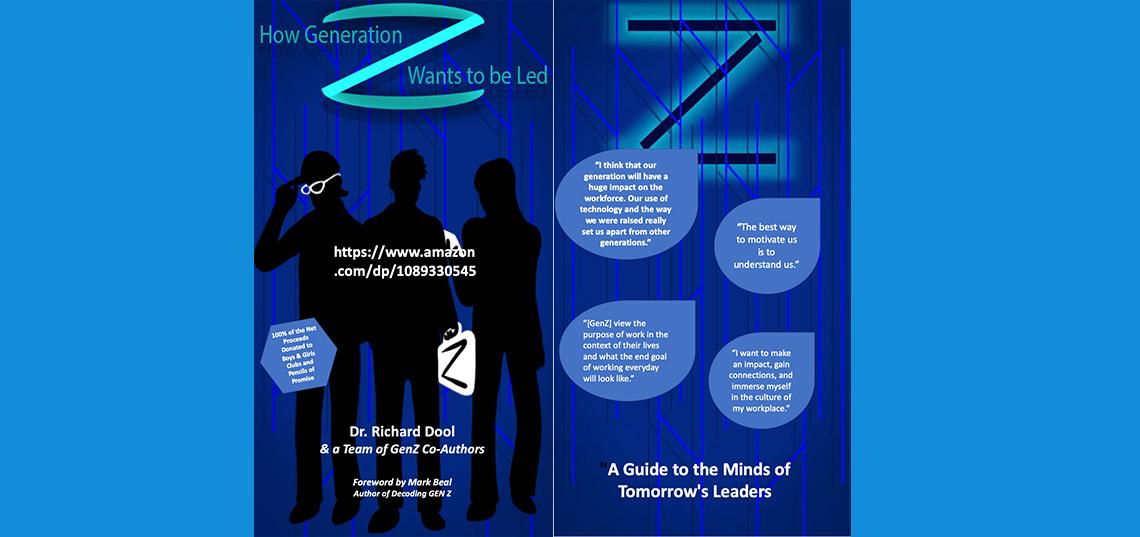
“How Generation Z Wants to Be Led,” by Teaching Professor and Director of the Master of Communication and Media Program, Richard Dool, DMgt., was released today by Amazon. Dool wrote the book with a team of Gen Z co-authors, and the forward was written by SC&I’s Assistant Professor of Professional Practice Mark Beal.
By writing his new book with 41 members of Generation Z, people who were born between 1997 – 2010, Dool said the book will enable leaders and managers to “learn about this emerging generation in their own words.”
“In true Gen Z fashion,” Dool said, “100% of the net proceeds of the book will be donated to the Boys and Girls Clubs and Pencils of Promise.”
Read our Q&A below with Dool to discover why leaders who learn to leverage the energy, motivation, and social awareness and dedication Generation Z brings to the workforce will assist them in their quest to add significant value to their organizations.
What is the thesis of the book, and why were you inspired to write it?
The idea behind this book came from three intersections. A colleague, Mark Beal, has been writing about Generation Z for some time and his recent book “Decoding Gen Z” prompted my interest to dive deeper into this Generation. I have been immersed with some Gen Zers in my undergraduate classes and I wanted to learn more to create more optimal engagement opportunities. Finally, a colleague had an opportunity to interact with a group of Gen Zers in a “Principles of Management” class. These three intersections promoted the notion of ‘crowdsourcing’ a book on Gen Z to help add to the dialog about this coming Generation. It was also a chance for this group of Gen Zers to explore and apply concepts and practices they were discussing in class.
Who will benefit most by reading it?
Those who are hiring and leading Gen Zers as they enter the workforce. Also, older generation colleagues who will be working with Gen Zers.
How do you think the book will have its greatest impact?
If we can learn more about this emerging generation and understand how to leverage their values, attributes and expectations, we may be able to create organizational advantages.
How did you conduct the research?
We spent several months researching Gen Z data and trends as well as speaking with more than 100 Gen Zers to gain their perspectives. We organized the book around themes on how Gen Z wants to be led. We used several lenses, for example, motivation, change, conflict and communication.
What are some of the most surprising findings?
They can work in teams and understand the value, but prefer to work more individually. They think they are misunderstood when it comes to the use of technology and social media. They think their experience, comfort, and skill with technology is under-valued and superficially assessed. They most definitely value social presence and advocacy, they will focus on the organization's purpose as a key element in their decision making on joining or staying with an organization.
What advice do you have for managers who are leading Gen Z staff?
Do your homework, this is a complex, dynamic cohort and we can quickly come to stereotypical conclusions. That is a mistake, we need to dive deeper to understand them and to fully leverage their potential.
Why did you decide to donate the net proceeds to The Boys and Girls Clubs and Pencils of Promise?
I really did not do this for personal gain (book sales). There was also the practical problem of how to share proceeds with 41 students. True to form for Gen Z and their value of social responsibility, I offered the notion of donating our proceeds and they were 100% all in on that.
Why did you choose both of these organizations, and are you asking them to spend the $ in support of a particular effort?
I asked my Gen Z co-authors to choose an organization to donate our proceeds to. They researched several organizations and selected these two because of the focus on under-served children.
To learn more about the Master of Communication and Media Program (MCM) at the Rutgers School of Communication and Information (SC&I), click here.
